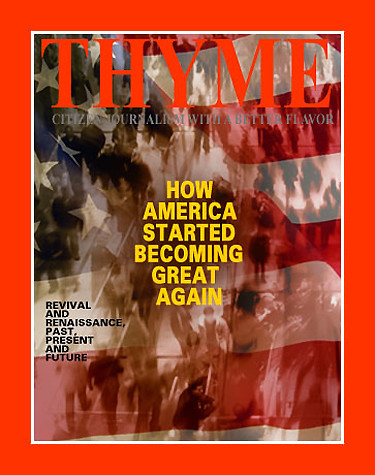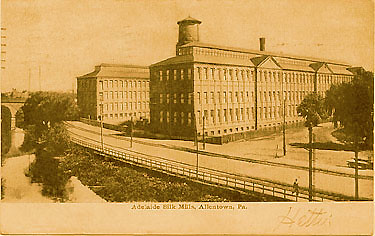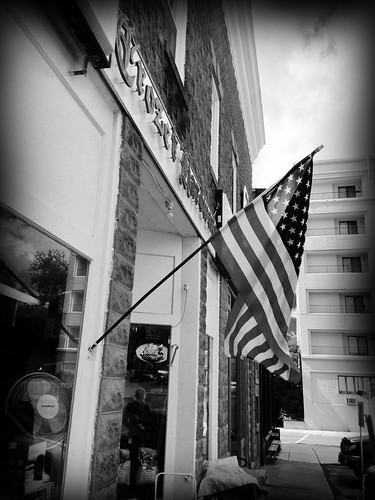Citizen Journalism with a Better Flavor
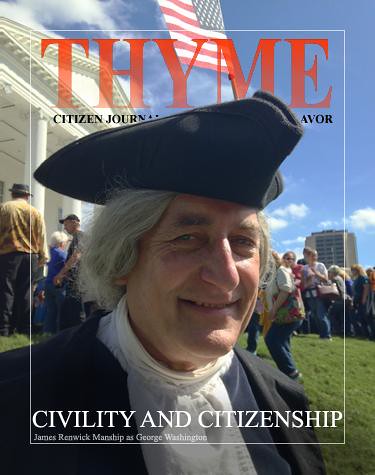 Volume XII, Issue XI
Thoughts on Civility
Approaching our Gubernatorial Election, these Thoughts Still Apply:
America is at a crossroads, and I believe we should take every opportunity to stand up for the things of God and His Word.”
Volume XII, Issue XI
Thoughts on Civility
Approaching our Gubernatorial Election, these Thoughts Still Apply:
America is at a crossroads, and I believe we should take every opportunity to stand up for the things of God and His Word.” –Franklin Graham
Franklin Graham has just traveled to all 50 states in 2016 to hold prayer rallies, to preach the Gospel, and to challenge believers to take a stand and take action. He’s be urged Christians to vote, to live out their faith in every part of their lives, and to pray for our nation just as
Nehemiah cried out to God to rebuild the walls of Jerusalem and restore hope to His people.
Sadly, we live in an age of ugliness. We have much rebuilding to do. The recent news that a Presidential candidate has been caught on videotape making very inappropriate remarks
(albeit eleven years ago) causes us rightly to recoil in disgust. We have daughters and granddaughters, wives and nieces... you get the picture. We do not want this ugliness in our places of leadership. We cannot tolerate it. We want better from those we choose to represent us.Some of us really want to leave a better world to our children and grandchildren.
But it must also be said that the latest revelation is hardly the only instance of tawdry revelations from high places. Even the glory of Kennedy's Camelot was tarnished by the hard reality of the President's unfaithfulness. Fast-forward to the 1990's and the uncomfortable need to explain to our children certain things previously not necessary to talk about that are mentioned on the nightly news. This did not happen overnight. We cannot fix it overnight.
Excuses do not make it right. It does not matter if it is
"your guy" or
"my guy," we cannot excuse it. We can forgive it but it calls for repentance on the part of the one who brings it. Our young people cannot remember an age of civility, at least a form of polite assent to it. That is a poverty of culture that we must address. All of us have become desensitized to a coarseness our elders would not have tolerated. Our society is very much the poorer for it. Not surprisingly, history tells us that men and women of Faith have lifted decadent cultures before. It happened in ancient Rome where Christians fished the discarded babies from the Tiber River and nurtured them.
It happened during the plague, when Christians cared for the sick when others would not go near... a phenomenon seen again in Philadelphia during the 1793 yellow fever epidemic where two free black men;
Absalom Jones and
Richard Allen [1.] volunteered to nurse the victims of the fever. In 1794 Allen would become one of the founders of the African Methodist Episcopal Church. It is easy to see that our present culture needs to be lifted. It is quite a challenge to step forward in the calling to lift it.
Yet history teaches us that it can be done, and the effort and risk are well worth it for the sake of our sons and daughters. Here are some thoughts on how our culture has declined, what we have lost, and how we might indeed begin to restore true dignity to the America we love.
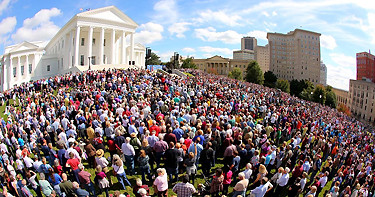 Billy Graham Evangelistic Association Photo.
Billy Graham Evangelistic Association Photo.
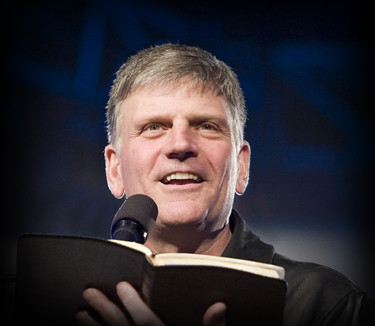 “Let thine ear now be attentive, and thine eyes open, that thou mayest hear the prayer of thy servant, which I pray before thee now, day and night, for the children of Israel thy servants, and confess the sins of the children of Israel, which we have sinned against thee: both I and my father's house have sinned.” -- Nehemiah 1:6
Billy Graham Evangelistic Association Photo.
Franklin Graham [click to view] at the final stop of his Decision America Tour, Raleigh, North Carolina.
The Decline of Civility
“Let thine ear now be attentive, and thine eyes open, that thou mayest hear the prayer of thy servant, which I pray before thee now, day and night, for the children of Israel thy servants, and confess the sins of the children of Israel, which we have sinned against thee: both I and my father's house have sinned.” -- Nehemiah 1:6
Billy Graham Evangelistic Association Photo.
Franklin Graham [click to view] at the final stop of his Decision America Tour, Raleigh, North Carolina.
The Decline of Civility
[click to read]
By Walter Williams
One of the unavoidable consequences of youth is the tendency to think behavior we see today has always been. I'd like to dispute that vision,
(read more)
 'Civility and Tolerance'
[click to read]
By Michelle Malkin
T
'Civility and Tolerance'
[click to read]
By Michelle Malkin
They told us if
Barack Obama were elected, the nation would come together. Souls would be fixed. Spirits would be healed. Public discourse would be elevated. Welcome to civility and tolerance in the Age of Obama:
(read more)
 Visions
Visions
[click to read]
by Paul Greenberg
Albert Speer, the technocratic master of Adolf Hitler's war machine, busied himself churning out custom-made excuses for his war crimes as that conflict ground on to its bloody end. But what if, in his rush to misjudgment about himself and his motives, he had accidentally stumbled on a truth?
If only he had had a good classical education, Herr Speer sighed, and had paid more attention to each citizen's responsibility for what was being done in the name of We the People, the Reich!, he might have avoided his sad fate. Yes, he might have found himself a martyr to conviction in any case, but that conviction would have been based on something more worthwhile than his own self-promotion.
Is it possible, in today's shrunken little world of American politics, even to imagine such ideals? In the tiny universe bordered on the right by Donald Trump's egotism and on the left by Hillary Clinton's career-long history of dissembling, is there room at all for seriously weighing the merits and demerits of any course of action?
Too many of us are reduced to being watchers, not actors. The worst of it is that, in the end, there is no end in sight. Of course there would be a modern word for this endless emotional boredom: anomie, or the absence of any emotion at all. Depression, the shrinks call it, but it is something much more: a soul-sickness that doesn't even recognize the existence of the soul.
(read more)
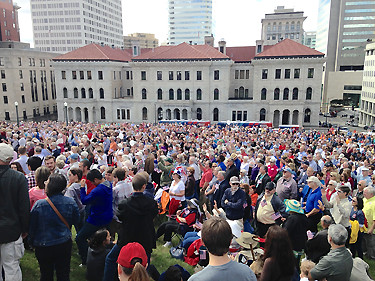 8200 people gathered in Richmond, Virginia's Capitol Square to pray for our nation. Franklin Graham led them.
Thoughts on Citizenship
8200 people gathered in Richmond, Virginia's Capitol Square to pray for our nation. Franklin Graham led them.
Thoughts on Citizenship
REMARKS TO THE LIBERTY UNIVERSITY CONVOCATION
RALPH REED, CHAIRMAN, FAITH AND FREEDOM COALITION
OCTOBER 10, 2016
(remarks as prepared for delivery)
Thank you, Jerry, for that very generous introduction. I am privileged and honored to be associated with Liberty University, if only for this occasion and on this day.
Jerry Falwell,
Sr., the founder of this university, was a dear friend who encouraged and supported me in my early forays into the political arena. He inspired me, in the words of the Apostle
Paul, to
“follow me as I follow Christ.” To see Liberty University grow from its humble beginnings as a Baptist Bible college nestled in the Blue Ridge Mountains in rural western Virginia to become the largest Christian university in America is a testament to the promises of God, the faithfulness of its founder, and the leadership and managerial gifts of Jerry, Jr.
In 29 days the American people will go to the polls in one of the most consequential elections of our lifetimes.
Not only is the presidency on the ballot, but today as we gather there are probably eight Senate races within the margin of error, and control of the U.S. Senate hangs in the balance. And because of the vacancy created by the untimely death of
Antonin Scalia, a vacant seat on an evenly divided Supreme Court will be filled by the next president. So all three branches of our national government are on the ballot.
Today I wish to discuss our call as Christians to be effective citizens both of the United States and of a heavenly kingdom that is both here now and is yet to come, offer a Biblical model for that citizenship, and more specifically how that call requires us to think and act as believers with particular reference to the 2016 election.
As Christians, we are dual citizens---first of the nation in which we reside, and secondly of a heavenly Kingdom. In effect, we carry two passports: one for the America, and the other for the Kingdom of God. We are in a spiritual sense not unlike those Jews who hold dual citizenship of their country of origin and of the state of Israel. Each of these citizenships carries with it certain obligations, duties, and responsibilities that we should take very seriously.
As heavenly citizens, we should pray, read the Bible, attend worship services, tithe, give to the poor, and serve others. As earthly citizens, we should pay taxes---but only what we owe---there is nothing wrong with taking legal deductions.
(Laughter) We should be informed, be registered to vote and vote, and contact our elected officials to make our views known on timely issues and legislation.
Jerry Falwell used to say his mission was to get people born again, baptized, and registered to vote. There was some humor in that statement, but as you will see when I walk through what the Bible teaches us about citizenship, there is some sound theology as well.
I believe there are four main elements of effective Christian citizenship.
First, we should participate. Based on census tract data and exit polls, my organization, Faith & Freedom Coalition, estimates that 17 million evangelical Christians did not go to the polls in 2012 either because they not registered to vote or because they were registered but did not bother to show up and cast a ballot.
Nor is this phenomenon limited to Christians. In 2012 only 57 percent of adult eligible voters cast ballots and, according to the Pew Research Center, there are approximately 61 million adult eligible citizens who are not even registered to vote. Christians should act differently.
As believers, we should treat our citizenship as a gift from God and exercise it in a muscular and robust manner, both as a witness to power of our faith in Christ, and to advance righteousness and oppose evil.
We see a dramatic example of this in the Book of Acts, when the apostle
Paul is detained in Jerusalem after creating a public disturbance while preaching. When Roman soldiers take him into custody, they tie him up and are about to flog him, when he turns to the officer in charge and asks one simple yet profound question: “Is it lawful for you to do this to a Roman citizen?” Filled with fear, the soldiers immediately untie him, apologize profusely, and escort him to their commander. Later, when his enemies attempt to have him convicted in a show trial and executed, Paul asserts one of the most cherished rights of a Roman citizen: he appeals his case to
Caesar. We can’t appeal our legal cases all the way to the president, but a Roman citizen who believed their rights were being violated and justice was being denied could request that their case be heard by Caesar. By this political and legal act, the Gospel message reached the courts of the emperor of Rome.
Paul was willing to die for the Gospel, and ultimately he did. But he was not willing to surrender the rights that were his as an earthly citizen. Neither should we.
This is not about the moral character of a given government or leader. The Romans were infamous for their wanton cruelty, brutality, and barbarism. That was beside the point. Paul was a servant of the Lord Jesus Christ---and he used his citizenship as a tool to share his faith in Christ and build God’s Kingdom.
Like modern-day Pauls, we are followers of Christ and citizens of the most powerful nation on earth in our time. Now more than ever, people of faith must use their moral imagination when it comes to both the possibilities and limits of politics. Politics cannot save the lost or force moral sentiments upon the unregenerate heart. But politics can defend the innocent and vulnerable , advance righteousness, establish the common good, it can protect the rights of the poor, the alien and the sojourner, restrain evil, resist tyranny, and expand the boundaries of liberty and freedom. It also sets the tone for a culture. As former Secretary of Education Bill Bennett has rightly noted, the law is a teacher, acting like white chalk marks on the field of a culture, establishing boundaries of right and wrong, morality and justice. Martin Luther King said, “It may be true that the law cannot make a man love me, but it can keep him from lynching me, and I think that’s pretty important.”
Which brings us to the 2016 elections. Some claim that the choice in this election is between two deeply flawed individuals who represent merely the lesser of two evils, and that as men and women of faith and conscience we have no real stake in the decision.
Some, including brothers and sisters in the faith, point to the recently unearthed comments by
Donald Trump in a 2005 interview in which he made demeaning comments about women as evidence confirming this argument.
Those eleven-year-old comments were offensive and inappropriate. As a father of two daughters, including one who is with me here today, I did not appreciate them. I am glad that Mr. Trump has apologized for them. As a Christian, I believe, as the apostle
Paul wrote to
Timothy, that we should treat older women as our mothers and younger women as our sisters, in all purity.
I also believe that someone who is faithful in small things will be faithful in large things, and one who is unfaithful in small things will be unfaithful in larger things. As Secretary of State, Trump’s opponent set up a home-brewed email server and, according to the FBI, was careless and negligent in handling classified material. After a year-long investigation, the FBI assessed that Mrs. Clinton’s email server was hacked by foreign intelligence services, exposing our nation’s most vital secrets to our worst enemies.
Hillary Clinton also deleted over 33,000 emails, including thousands of emails involving official State Department business, in clear violation of federal law. She then lied to the American people and Congress about doing so. At the time, she was the third highest ranking official in the Cabinet, behind only the president and vice-president. If someone violates the public trust and mishandles classified material as a member of the Cabinet, there is no reason to believe they will be more faithful in the weightier, solemn and higher responsibilities of the presidency.
Given this choice, it may be tempting to sit on the sidelines. One friend of mine says he will write in Peyton Manning for president.
(Laughter) But I’m not in favor of wasting our votes by casting them for Santa Claus or retired football players, or others who have no chance of becoming president. We must confront the choice before us and vote for someone who actually has a chance to become president. We dare not and we cannot surrender our vote during such an important election. Retreating to the stained-glass ghetto from whence we came, refusing to muddy our boots with the mire and muck of politics is not an option for followers of Christ. We are called to put away our “my way or the highway” pride, forsake cynicism and negativity, and participate fully as citizens, always cheerful, always winsome, always ready to defend our faith. We should focus not on the negative, but on what is true, honorable, right, pure, and lovely, anything of excellence and anything worthy of praise, fully prepared to confront the hard choices that Providence presents us in our mission to advance the good and resist evil.
In one of the most famous speeches he ever delivered as a candidate or as president, often called the “Evil Empire” speech,
Ronald Reagan urged when he addressed the National Association of Evangelicals in 1983 to “beware the temptation of pride---the temptation of blithely declaring yourselves above it all and label both sides equally at fault,” to declare a pox on both houses “and thereby remove yourself from the struggle between right and wrong and good and evil.”
Reagan spoke of Christians at the time who pretended that because capitalism and communism were both flawed systems that both were equally to blame. The same basic principle could be applied to the two options in this election. As I will get to in a minute, on issue after issue on matters involving grave and intrinsic moral evil, there are stark differences between the two major-party nominees for president.
So we must participate. If we do, we can make a difference. According to exit polls, self-identified evangelical Christians comprise roughly 27 percent of the electorate; faithful, frequently Mass-attending Roman Catholics made up another 10 percent of the electorate. Together they are the largest, most vibrant, and most dynamic single constituency in the electorate today; a larger force than the Latino, the African-American, and the union vote combined.
Second, we must persuade. We cannot enter the civic arena armed only with a King James Bible and an appeal to Biblical morality.
Teddy Roosevelt said a thorough knowledge of the Bible was more important than a college education. Perhaps he said that because he attended Harvard.
(laughter) But that is certainly not the case in today’s culture. For much of our history, the raw material that formed our common language could be found in the Bible, Shakespeare, and the classics of Greek and Latin literature. Today the common reference points are films, popular music, social media, and television, including the Kardashians. So we must learn as believers to speak in the language and dialect of our audience. In that same episode in the Book of Acts I alluded to earlier, the crowd in Jerusalem threatened a riot. But when Paul began to speak to them in their own Hebrew dialect, they fell silent and listened. If we will speak to our listeners in a voice and language they can comprehend, we will gain their hearing, if not always their assent.
To persuade, we must know and understand public policy, appeal to the social sciences for evidence of which policies work and why, we should develop a broad policy agenda that deals with jobs, growing the economy, income inequality, education, immigration, human trafficking, criminal justice reform, and ameliorating poverty. And we must do so while reaching out to those who have not always have felt welcome in our ranks: women, African-Americans, Latinos, and young people.
Honey attracts more than vinegar, and a winsome attitude wins our fellow citizens more than harsh language or angry words. The book of Proverbs says, “The tongue of the wise makes knowledge acceptable,” and “sweetness of speech increases persuasiveness.” Bill Rusher said that Barry Goldwater and Ronald Reagan believed in the same things, but Barry said them with a frown and Reagan said them with a smile, and that made all the difference.
Third, we must persevere. Bringing our faith to bear to bring social change through political action is a marathon, not a sprint. No matter what happens on November 8, we will not restore America to repentance or moral renewal in a single election or a single generation. It will take my entire lifetime and perhaps yours as well.
Consider the cause for civil rights. The first slaves arrived on this continent in 1619. They did not gain their freedom until 1865, and even then their rights were violated by segregation, the doctrine of separate but equal, and what historian C. Vann Woodward called “the strange career of Jim Crow.” The NAACP was founded in 1909. But it was not until 1964 and 1965 that equal accommodations and voting rights became federal law. That struggle spanned over three centuries, and it is still not over today.
The same was true of social reform movements from suffrage to temperance to progressivism.
The pro-family, religious conservative movement is only about 40 years old. We are not even in adolescence in terms of the maturation of our movement. We have much to learn, much to do, and much more to share about who we are, what we believe, and our aspirations for American society.
Fourth, we must pray. The Bible commands us to pray for those who are in authority, not just for those who share our political views. Paul exhorted that “prayers, intercessions, and giving of thanks” be made for “kings and for all that are in authority; that we may lead a quiet and peaceable life in all godliness and honesty.” (1 Timothy 2:2) He wrote this at a time when the bloody and venal Nero was Caesar. “All those in authority” literally means “all”---liberal and conservative, Republican and Democrat. Contrast the relative quietude, peace, and prosperity that America has enjoyed with the civil unrest, bloodshed, ethnic strife, and general unrest of the rest of the world and ask yourself if our obedience to pray and intercede for all our leaders has not played some role in the success of the American experiment in self-government.
Abraham Lincoln said,
“I have been driven many times to my knees by the overwhelming conviction that I had nowhere else to go. My own wisdom and that of all about me seemed insufficient for that day.” That is true of not only our current president, but his successor, whoever that may be. Let us pledge to always pray for their protection, their wisdom, and the counsel of their advisors.
Now, a final word about 2016. On the issues that matter most to the Christian community, the differences are quite clear, they are dramatic, and they are undeniable.
On the issue of the sanctity of innocent human life, Donald Trump has pledged to protect life from conception to natural death, and he is running on the most pro-life platform in the modern history of the Republican party. Hillary Clinton has vowed to do all she can to insure that Roe v. Wade, which imposed the most liberal abortion regime in the Western world on all 50 states, remains the law of the land.
She is the first presidential candidate ever be endorsed in a primary by Planned Parenthood, the largest abortion provider in the country, and she is the first candidate in 40 years to shatter the bipartisan consensus that taxpayer funds should not be used to take unborn life by calling for repeal of the Hyde Amendment. Doing so would allow federal taxpayer funds to be used for the first time to pay for elective abortions under the Medicaid program. According to the Alan Guttmacher Institute, this would result in hundreds of thousands of additional abortions over the next decade. These are unborn children who will never know what it means to be held by a loving parent, to be cherished and valued, and to be welcomed into the world.
In a speech last year, Hillary Clinton even said that in order to guarantee access to abortion on demand,
“Deep-seated cultural codes, religious beliefs and structural biases have to be changed.” Imagine an individual aspiring to our nation’s highest office arguing that religious beliefs must be adapted to allow for the taking of life made in God’s image. This is open hostility to faith in advance of a political agenda, pure and simple.
On the issue of religious freedom, Donald Trump supports the Supreme Court’s decision in the Hobby Lobby case giving closely-held businesses and corporations the right to reflect the deeply held religious beliefs of their founders. Hillary Clinton criticized the decision.
Trump also is the first candidate of either party to call for the repeal of the Johnson Amendment, an amendment to the tax code inserted by then-Senate Majority Leader Lyndon Johnson that prohibited all political speech by churches. This provision has been used by the IRS to intimidate, harass, silence, and persecute churches and ministries for six decades, violating the First Amendment right to political speech of millions of Americans.
On the issue of judges, Donald Trump has released a list of 20 outstanding conservative jurists who would likely form the top candidates to replace the late Antonin Scalia on the Supreme Court, as well as fill future vacancies. No nominee of either party has ever released such a list prior to the election. Hillary Clinton has said that the only people she would even consider for the Supreme Court are those who agree that Roe v. Wade is settled law. She reiterated that position last night in the televised debate.
And finally, Donald Trump opposes the Iran nuclear deal, which would allow the leading state sponsor of terrorism in the world to keep its uranium enrichment program and eventually obtain weapons of mass destruction. This is the bloodiest and most dangerous regime in the bloodiest and most dangerous region of the world, a regime that funds and trains the command structure of Hamas, bankrolls Hezbollah, props up
Bashar el Assad’s bloody regime in Syria, which has killed over 400,000 innocents, and funded militias that killed U.S. soldiers in Iraq. I believe this agreement poses an existential threat to the survival of Israel. Hillary Clinton not only supported it, she helped to negotiate it. Donald Trump promises to revisit the agreement as president. As a supporter of Israel’s right to exist, I want a president who will revise, amend, or strictly enforce this agreement in a way that prevents Iran from obtaining a nuclear weapon.
On these issues, as well as taxes, the repeal of Obamacare, education reform and school choice, the redefinition of marriage, and rebuilding our hollowed-out military, the contrast is stark and undeniable. The choice is clear. In my view a third party or write-in candidate is simply not a viable option. And I thought that before Gary Johnson said he had no idea what Aleppo was.
Let me close by quoting the prophet
Isaiah, who faced even darker and direr times in ancient Israel. Surrounded by political leaders who were corrupt and unfaithful, he still offered a vision for Israel filled with hope:
Make ready the way of the Lord
Make His paths straight
Every valley will be filled
Every mountain and hill brought low
The crooked will become straight
And the rough roads smooth
And all flesh will see the salvation of God
If we will see our citizenship as means to witness for our faith, to stand for the right and oppose evil in its many ugly forms, and not just a way to advance our own partisan or personal preferences, then Isaiah’s words can become our prayer, it can lead us to the noble deeds of moral actions, and then with God's help we can heal our land and restore America to greatness. Thank you, and God bless you.
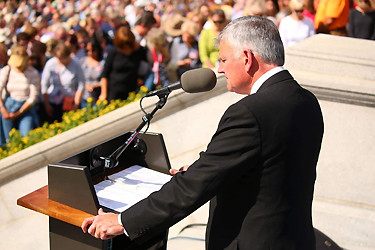 Billy Graham Evangelistic Association Photo.
Billy Graham Evangelistic Association Photo.
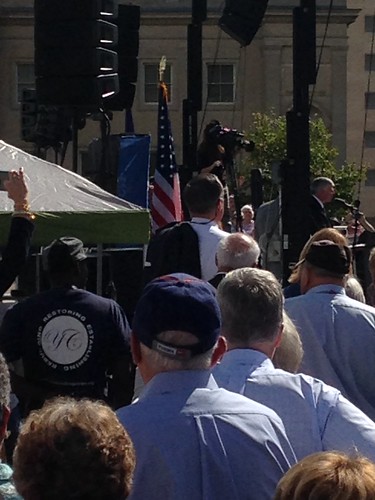
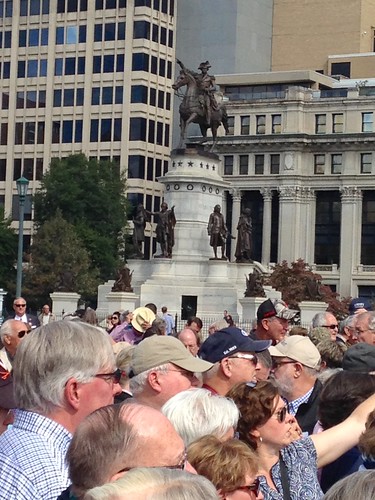
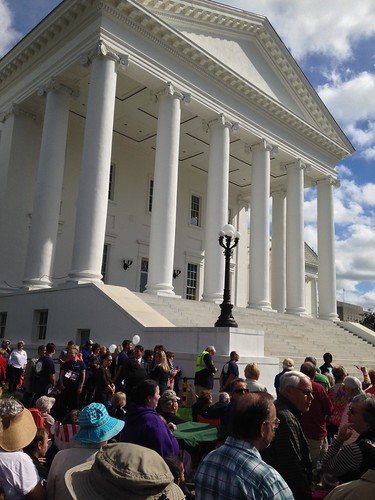 Praying for our nation in Richmond, Virginia.
The America I Love
Praying for our nation in Richmond, Virginia.
The America I Love


 Light and Glass, Richmond,Virginia
Light and Glass, Richmond,Virginia.

